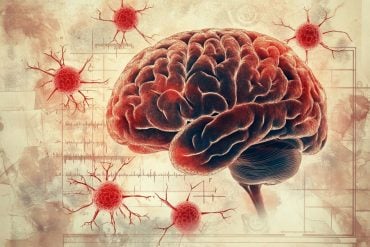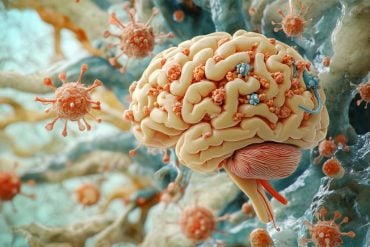Summary: A diet rich in foods containing isoflavone, a plant-based compound found in legumes, chickpeas, and peanuts, that resembles estrogen, protects against multiple sclerosis symptoms in mouse models.
Source: University of Iowa
A new University of Iowa study suggests that metabolism of plant-based dietary substances by specific gut bacteria, which are lacking in patients with multiple sclerosis (MS), may provide protection against the disease.
The study led by Ashutosh Mangalam, PhD, UI associate professor of pathology, shows that a diet rich in isoflavone, a phytoestrogen or plant-based compound that resembles estrogen, protects against multiple sclerosis-like symptoms in a mouse model of the disease. Importantly, the isoflavone diet was only protective when the mice had gut microbes capable of breaking down the isoflavones.
The findings were published July 9 in Science Advances.
“Interestingly, previous human studies have demonstrated that patients with multiple sclerosis lack these bacteria compared to individuals without MS,” Mangalam says. “Our new study provides evidence that the combination of dietary isoflavones and these isoflavone metabolizing gut bacteria may serve as a potential treatment for MS.”
Isoflavones are found in soybeans, peanuts, chickpeas and other legumes. The study also found that mice fed the isoflavone diet have a microbiome that is similar to the microbiome found in healthy people and includes the bacteria which can metabolize isoflavones. Conversely, a diet lacking isoflavones promotes a microbiome in mice which is similar to one observed in patients with MS and lacks beneficial bacteria that can metabolize isoflavone.
Multiple sclerosis is an autoimmune disease of the brain and spinal cord where the immune system attacks the protective coating surrounding nerve fibers. The symptoms of this disease include muscles weakness, balance issues, and problems with vision and thinking. While there are treatments that slow down the disease, there is currently no cure for MS.
Although the exact cause of MS is unknown, a complex interaction between genetic and environmental factors are thought to initiate the disease. Recently, the gut microbiome–the trillions of gut bacteria the live inside human intestines–has emerged as a potential environmental factor that contributes to MS.
In prior work, Mangalam and colleagues demonstrated that there are significant differences between the gut microbes of patients with MS and people without MS. Specifically, patients with MS lacked bacteria that are able to metabolize isoflavones.
Although the role of gut microbiome in human diseases such as MS is being appreciated, the mechanism through which these gut bacteria might influence the disease is poorly understood.
In the current study, Mangalam’s team, including first author Samantha Jensen, a UI graduate student in immunology, found that the bacteria that are lacking in patients with MS are able to suppress inflammation in a mouse model of MS. The team compared the effects of an isoflavone diet and an isoflavone-free diet on disease in the mouse model of MS.

They found that the isoflavone diet led to disease protection. However, when the team placed the mice on the isoflavone diet but removed the isoflavone-metabolizing gut bacteria, the isoflavone diet was no longer able to protect against MS-like symptoms. When the bacteria were reintroduced, the protective effect of the isoflavone diet was restored.
Furthermore, the team was able to show that a specific isoflavone metabolite called equol, which is produced by the gut bacteria from isoflavone, is also able to provide protection against disease.
“This study suggests that an isoflavone diet may be protective so long as the isoflavone metabolizing gut bacteria are present in the intestines,” say Mangalam, who also is a member of the Iowa Neuroscience institute and Holden Comprehensive Cancer Center.
Funding: The research was supported in part by the National Multiple Sclerosis Society, the National Institute of Allergy and Infectious Diseases, the National Institute of Environmental Health Sciences, and the Roy J. Carver Charitable Trust.
In addition to Mangalam and Jensen, the team included UI scientists Shailesh Shahi and Stephanie Peterson; Katherine Gibson-Corley at Vanderbilt University; Nicole Cady at the University of Michigan; and Arnav Gupta at the KK Birla in Goa.
About this diet and multiple sclerosis research news
Source: University of Iowa
Contact: Jennifer Brown – University of Iowa
Image: The image is in the public domain
Original Research: Open access.
“Isoflavone diet ameliorates experimental autoimmune encephalomyelitis through modulation of gut bacteria depleted in patients with multiple sclerosis” by Ashutosh Mangalam et al. Science Advances
Abstract
Isoflavone diet ameliorates experimental autoimmune encephalomyelitis through modulation of gut bacteria depleted in patients with multiple sclerosis
The gut microbiota is a potential environmental factor that influences the development of multiple sclerosis (MS). We and others have demonstrated that patients with MS and healthy individuals have distinct gut microbiomes. However, the pathogenic relevance of these differences remains unclear.
Previously, we showed that bacteria that metabolize isoflavones are less abundant in patients with MS, suggesting that isoflavone-metabolizing bacteria might provide protection against MS.
Here, using a mouse model of MS, we report that an isoflavone diet provides protection against disease, which is dependent on the presence of isoflavone-metabolizing bacteria and their metabolite equol. Notably, the composition of the gut microbiome in mice fed an isoflavone diet exhibited parallels to healthy human donors, whereas the composition in those fed an isoflavone-free diet exhibited parallels to patients with MS.
Collectively, our study provides evidence that dietary-induced gut microbial changes alleviate disease severity and may contribute to MS pathogenesis.






